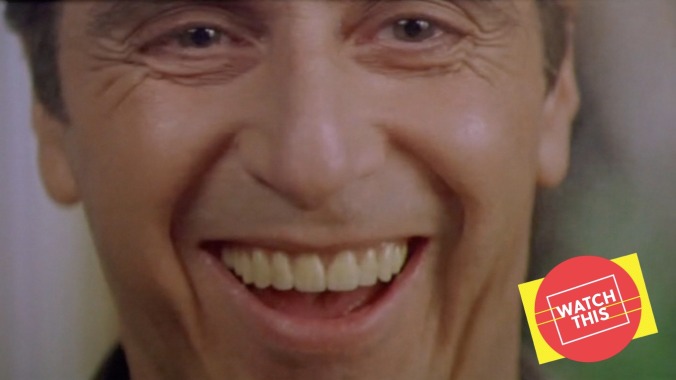Al Pacino had a sinfully good time playing the biggest bad in The Devil’s Advocate

Watch This offers movie recommendations inspired by new releases, premieres, current events, or occasionally just our own inscrutable whims. This week: With Cruella coming to theaters and Disney+, we’re looking at some of our favorite extravagant and over-the-top villains from film history.
The Devil’s Advocate (1997)
It may be hard to believe now, basking in the joy of Al Pacino’s recent performances in The Irishman and Once Upon A Time… In Hollywood, but there was a time in the 1990s when his gifts for hammy bombast were regarded with a stern wariness. After winning an overdue Oscar for, yes, hammy bombast personified in Scent Of A Woman, Pacino went on a watchlist, with critics and fans ready to flag every sinful indulgence of his more outsized actorly tendencies.
Accordingly, 1997 found his quiet (and excellent) performance in Donnie Brasco embraced, while his work in The Devil’s Advocate was—to some degree—condemned. Like Brasco, Devil’s Advocate pairs Pacino with a younger, Gen-X actor, often in a series of walk-and-talks where he gives his young costar the lay of the land. Here, Pacino’s would-be mentee is Kevin Lomax (Keanu Reeves), a prodigiously talented lawyer from Florida, courted by John Milton (Pacino), the head of a high-powered New York law firm. As it turns out, Pacino is actually playing Satan. A non-metaphorical, non-subtextual Old Scratch.
Inevitably, this means Pacino will rant and holler with fiery impunity. With this in mind, the movie, paced with the leisurely, luxury-class confidence of the John Grisham adaptations it shamelessly literalizes, holds Pacino back slightly. He doesn’t speak until the 20-minute mark, and for a while turns up occasionally, as Lomax wrestles with his conscience and spars with his wife Mary Ann (Charlize Theron), who does not take to a life of Manhattan-housewife leisure. “I’m a surprise,” Milton tells Lomax at one point, expounding on his strength as a lawyer. “They don’t see me coming.” Quite the contrary, though: The precise pleasure of The Devil’s Advocate is that the audience does see him coming—even if the trailers didn’t spoil Milton’s identity, the title does—and has to wait a while for Pacino to reveal his full demonic splendor.
 Keep scrolling for more great stories.
Keep scrolling for more great stories.
